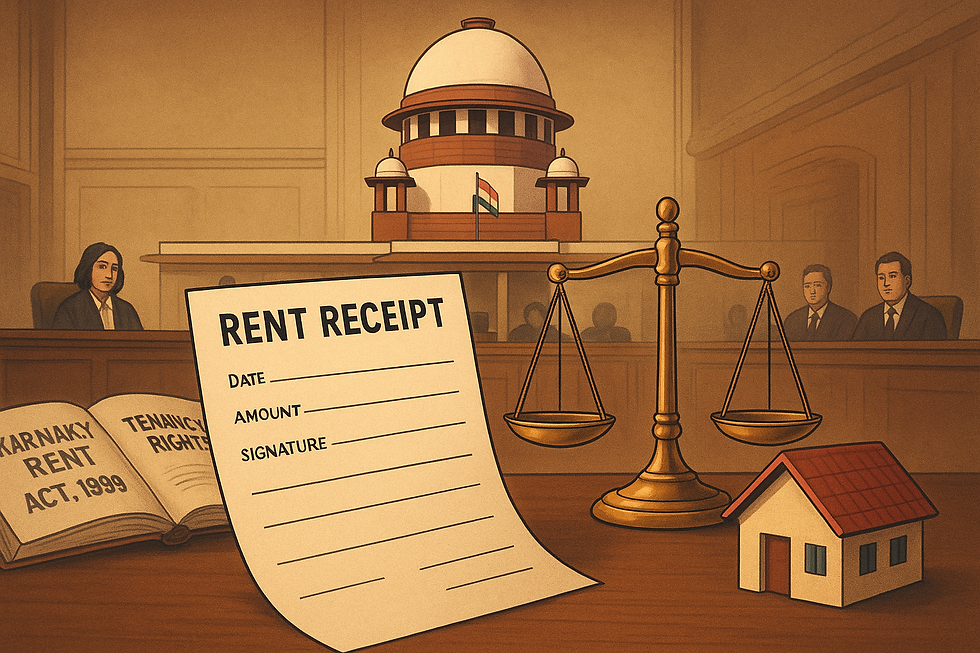Rent Receipt is prima facie proof of Landlord-Tenant Relationship: Supreme Court
- Lawttorney.ai

- Sep 17, 2025
- 3 min read
Case Name: H.S. Puttashankara v. Yashodamma.
Introduction:
The Supreme Court of India in a case delivered an important verdict clarifying the path to be pursued by courts while deciding the relationship of a landlord-tenant under the Karnataka Rent Act, 1999. The case arose when the High Court set aside an eviction order under the Rent Controller.

Background:
The Conflict was over a disputed property located at 26th Cross, Cubbonpet, Bengaluru. The appellant claimed to be the owner of the property based on a deed signed in the year 2015 in his Favor by his relatives. Appellant stated that the respondent’s mother, Mysore Lingamma, lived in the property as a tenant and had agreed during pervious eviction case also pay rent to appellant's father which as per him showed a landlord-tenant relationship. After Lingamma's death her daughter and the present respondent staying there as tenant. The Rent Controller held that the landlord-tenant relationship is stored and allowed the eviction petition and instruct the respondent to empty the disputed property. In 2021, the High Court nullified the order and held that the appellant had not proved that he is the absolute owner of the property. Therefore, appellant took the matter to Supreme Court.
Supreme Court ruling in landlord-tenant relations
The Apex Court relied on Section 43 of the Karnataka Rent Act, 1999, which laid down that if there is a conflict whether a landlord-tenant relationship exists, the court can treat a lease document as proof. If there is no document present, then a rent receipt signed by the landlord is initial (prima facie) evidence to prove landlord and tenant relationship.
In this case, the Court noted respondent paid the rent for the property between February 1, 2013, and May 31, 2014, and appellant issued the rent receipts to respondent. Therefore, this proved that appellant is acting as landlord as per section 3(e) of the Act.
Court noted, “When the initial burden as per mandate of Section 43 of the 1999 Act was discharged by the appellant-landlord by producing the rent receipts acknowledging the payment of rent by the respondent-tenant qua the suit property, the Court rightly proceeded with hearing of the case and adjudicated the matter on merits. The High Court in its own wisdom, misdirected itself in exercise of revisional jurisdiction in setting aside the order of the Rent Controller on the premise that jural relationship of landlord tenant does not exist between the parties because the appellant landlord wasn’t able to prove his lineage and relationship with Sri Banappa, who was purportedly the original owner of the suit property”.
The Apex Court observed that the High Court placed too much value to the fact that the respondent’s son didn't sign the rent receipts. Because of this, the High Court rejected the ownership of the appellant. The High Court also made a mistake by re-considering the facts at the time of the review petition.
Court added,
“The High Court in reaching a conclusion contrary to the Rent Controller, conducted a fact-finding exercise, which as per settled law ought to have been avoided in revisional jurisdiction”
“The High Court, in revisional jurisdiction, ought to have appreciated the same in light of Section 43 of the 1999 Act before setting aside the order of Rent Controller, which, in our view, has not been duly considered". Hence court allowed the appeal
Conclusion:
The Supreme Court ruled that the High Court made an error by re-examining the facts at the time of review, which is not allowed. The High Court also failed to apply the law under Section 43 of the Karnataka Rent Act before canceling the eviction order.
Empower Your Legal Practice with AI – Join Our Free Webinar!
Are you a legal professional looking to boost your efficiency and stay ahead in a competitive field? Discover the power of Lawttorney.AI – the cutting-edge tool designed to streamline legal research, automate tasks, and enhance productivity.
👉 Don't miss out! Reserve your spot in our FREE webinar and experience the future of legal practice today. Register Now



This is an insightful breakdown of landlord-tenant relationships under the Karnataka Rent Act. On a related note, students moving to a new city also need secure and reliable housing. For those studying in Australia, student accommodation in Perth provides safe, fully managed, and convenient living options, giving students peace of mind while they focus on their studies.